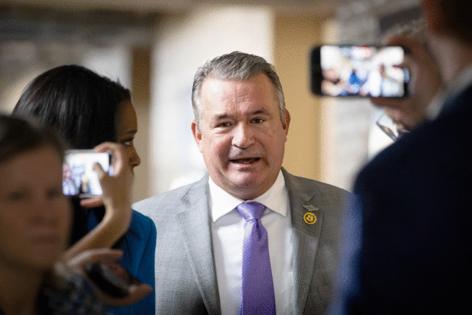Bipartisan health subsidy bill adds income caps, anti-fraud measures
Published in News & Features
WASHINGTON — A bipartisan group of House lawmakers released text of legislation Friday aimed at avoiding the health care subsidy cliff by extending Affordable Care Act tax credits for two years while installing income caps and anti-fraud measures.
Reps. Tom Suozzi, D-N.Y., Don Bacon, R-Neb., Josh Gottheimer, D-N.J., and Jeff Hurd, R-Colo., see the measure as a viable compromise that includes Democrats’ demand for a subsidy extension alongside protections sought by many Republicans. It would also significantly lengthen the open enrollment window, which would allow more people into plans, thus strengthening risk pools and lowering premiums.
The text arrives as much of Congress is divided on how to approach the possible end to enhanced premium tax credits under the 2010 health care law, which expire Dec. 31. Many Republicans see any extension as propping up the ACA and won’t support such a move. Without a solution, prices for insurance through state exchanges or healthcare.gov could force people to quit the coverage.
“It’s time to come together, Democrats and Republicans, put aside the partisan BS, and deliver a real solution that will cut health insurance premiums,” Gottheimer said in a statement.
The lawmakers, who spent the week working from a bipartisan framework, said their bill is getting attention in the Senate, where lawmakers haven’t come together on a compromise.
“I happen to know that there’s people in the Senate right now that are using our framework, but … they’re adjusting it. We would sort of expect that if they’re using our framework right now to try to negotiate an agreement. That’s what we wanted,” Bacon said at a news conference Friday.
Because the tax credits and premium prices remain unsettled as open enrollment approaches closing for most states on Dec. 15, the bill would extend the plan year 2026 enrollment period until May 15, 2026.
The lawmakers said the legislation would extend enhanced premium tax credits for enrollees earning less than 600% of the federal poverty level, or about $200,000 per year for a family of four. For enrollees earning more than that, the bill would “phase out” the enhanced subsidies, they said.
Bacon said he’s been listening to Senate Republicans’ demands. “I know that they wanted some kind of income caps,” said Bacon, who said the current cap of about $600,000 was insufficient.
The legislation would also create guardrails to prevent broker fraud and remove and penalize bad actors, while implementing consumer protections. The bill would require the marketplaces to regularly confirm enrollees’ eligibility with the Social Security Administration’s Death Master File and eliminate so-called ghost beneficiaries.
The marketplaces would be required to annually notify recipients the value of the tax credits they receive prior to enrollment.
A bill from Reps. Sam Liccardo, D-Calif., and Kevin Kiley, R-Calif., that also features a two-year extension largely follows a similar framework.
Unlike the Liccardo-Kiley bill, however, this legislation does not include language that would limit excessive payments to Medicare Advantage, a practice known as upcoding. The Liccardo-Kiley bill incorporated the Medicare Advantage language as an offset to pay for the tax credit extension.
©2025 CQ-Roll Call, Inc., All Rights Reserved. Visit cqrollcall.com. Distributed by Tribune Content Agency, LLC.







Comments